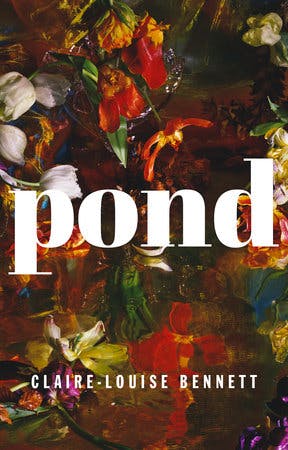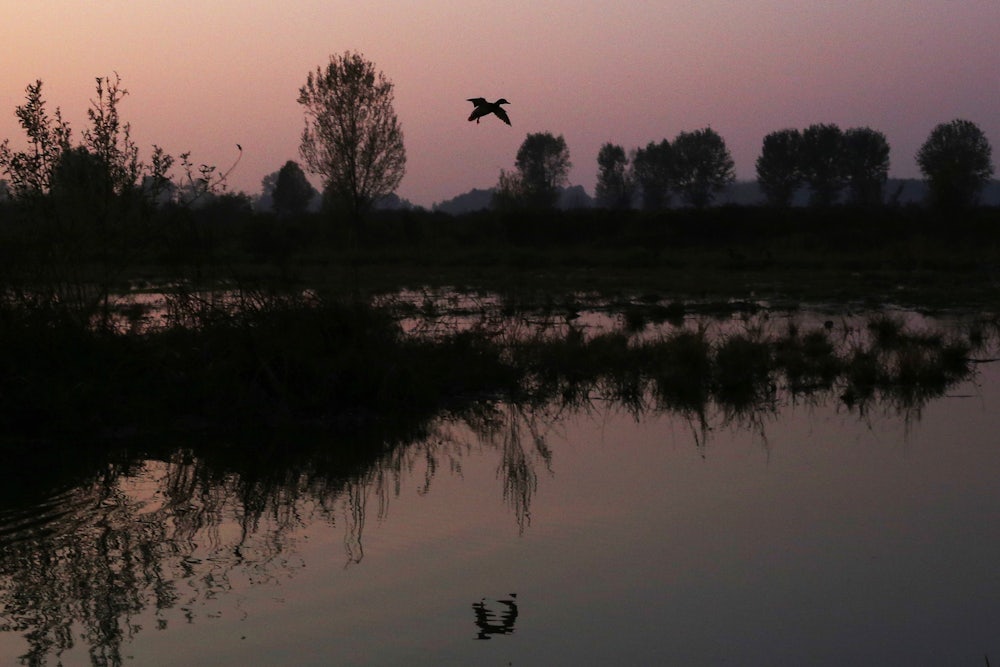In his strange and bewitching book The Poetics of Space, postman turned physicist turned philosopher Gaston Bachelard argues that houses are our storage containers our memories and imaginations. They are metaphysical and contain the cosmos—the poetry of life. He explains it thus, “I should say: the house shelters day-dreaming, the house protects the dreamer, the house allows one to dream in peace.”
Claire-Louise Bennett’s Pond—which was marketed as a collection of short stories upon its celebrated debut last year in Britain, but was packaged as a novel upon its celebrated debut in America—makes much of Bachelard’s metaphysical reasoning. Bennett even gives a clue about what similarly strange and surreal stuff she is up to in Pond by quoting Bachelard in her epigraph: “Wolves in shells are crueler than stray ones.” Gnaw on that bone for a while.
Pond’s focus is on the house, inside and out—traditionally considered the domain of the wife and her servants, and historically disregarded as a territory of fiction written by women. The book is comprised of twenty stories or chapters—whatever the reader prefers, perhaps—of the narrator in her cottage and on its grounds, making a case that she, the natural world, and the house are a part of the same ecosystem—even co-evolved organisms. In “To A God Unknown” she describes this shared corporeality,
A leaf came in through the window and dropped directly onto the water between my knees as I sat in the bath looking out. It was a thoroughly square window and I had it open completely, with the pane pushed back against the wall. It was there, level with the rim of the bath—I didn’t have to stretch or lean; it was almost as if I were in the coniferous tree that continued upwards, how tall.
Bennett isn’t the first to take this approach, certainly Virginia Woolf made her house alive in the “Time Passes” chapter of To the Lighthouse. After the Ramseys have shut up the summer house for the season, the reader is given a nearly characterless chapter of the house as it breathes:
Nothing stirred in the drawing-room or in the dining-room or on the staircase. Only through the rusty hinges and swollen sea-moistened woodwork certain airs, detached from the body of the wind (the house was ramshackle after all) crept round corners and ventured indoors.

But unlike Woolf’s closed up summer house, Pond’s house is not empty. The rented cottage is seemingly occupied by the same narrator, a nameless woman, a recluse who finds herself most at ease in the mundanity of her days. She has set herself as apart as much as she can from the busy, commercial world. She composts, she gardens, she ruminates on how to fix the broken nobs on her hob and obsesses about how to properly sweep leaves. These are the minutiae the narrator shares, it’s the mud she wades through, and her path is murky and unclear; answers to who she is, where she is, why she is there, and how she manages to get by are not proffered to the reader. Muddiness is not typically a positive description for a narrative, but this mud is sparkling, full of mica and minerals that glitter with color when the sun’s rays hit. It’s through this glistening mud that Bennett’s readers get to mudlark, mucking about in prose that is alternatively deliberate and crisp, surrealistic and unknowable, to find real gems of observation and language.
Though the title and some of the narrator’s observations deliberately reach back to that other famous literary pond, Bennett’s Pond is an altogether different body of water from Henry David Thoreau’s Walden. Pond is not about a prickish man throwing out the creature comforts of society for a brief and beautiful proto-hippy experiment—as the New Yorker’s Kathryn Schulz hilariously detailed last year in her ponderance on Thoreau, bitingly titled, “Pond Scum”—nor is it about the same privileged man who lived in a shack but likely didn’t have to do his laundry, as Rebecca Solnit elucidated in her Pushcart Prize-winning Orion essay, “Mysteries of Thoreau, Unresolved.” Oh no, this is a pond as it relates to the overlooked, under-described, and often dismissed life of a woman as herself, alone in a domestic realm but rarely lonely.
Unlike Ruthie, the narrator of Marilynne Robinson’s masterpiece of domesticity, Housekeeping, who has to find her way to her selfhood after a life of adapting to others, Pond’s protagonist springs into the narrative fully formed. The narrator even remembers herself as a child on “on the cusp of female individuation”—in the opening vignette, she remembers sneaking into a neighbor’s yard as a child to fall asleep. She’s doesn’t seek permission or approval from anyone or any place to experience or find her place in the world—this alone is deeply satisfying and refreshing in a novel about a woman at home. It is equally satisfying that Bennett stomps all over writing-dude-in-nature territory without having to set a foot off her main character’s property line.
Also different in Pond’s ecosystem is that the protagonist’s natural world includes the world of household chores—the kitchen is her microcosm. In “Morning, Noon, and Night,” she places a bowl next to the sink and begins to collect compost,
scraps and skins and teabags and rinds and stalks and weeping leaves and shells etc for the compost bin and the idea was to use a smallish bowl so that I would empty it often, daily in fact, but I don’t do that. I don’t do that and it piles up, it all piles up and sometimes, though this happens rarely, I tip it all into a bigger bowl and just carry on.
Carry on with what? Well for information there are always things that must be done—this, for one thing, after the fire has been lit of course. The birds need feeding at least once a day this time of year. And after a while I make the bed. I go up the steps and take a look in the post box. I like a coffee first thing….
This is the narrator’s life—the things to be done in the house—and that is where she is most comfortable. But there are intrusions. She becomes anxious and makes herself scarce when a wedding is hosted right outside her doors in “The Big Day”—it’s too much of an infringement on her seclusion, and routine. She has friends who she thinks about, and men who she lusts after. There isn’t a hint of Thoreau’s puritanical transcendentalism in Pond—Bennett is far more direct. Nature and sex are not to be untangled from one another, and the woman is not the Victorian “Angel of the House.”
Instead, Pond’s narrator is one who knows herself, or at least knows her surroundings and that she is a part of them. In “Morning, 1908” the narrator longs for a passerby, a young man, to notice her, take her even; she first feels “horror” which eventually recedes along with “fleshy reticence” to be replaced by feeling “like the most natural thing in the world.” She then lists some of these natural things of her world: Black trees, a humid bovine nostril, a sprawling chandelier, thin lace trim; her damp, unbrushed hair. These personal objects, house fixtures, handmade things, body parts, and trees, are all considered nature in Pond—everything is wild and alive.
Even though Pond is a book about the nature of selfhood, the narrator never fully emerges. The reader can only guess that the narrator wants to be alone for a multitude of reasons, but it’s never spelled out. For most books, holding back this much information about the main character’s backstory can feel stiff and gimmicky. But it works here because of Pond’s interiority—the narrator explores her observations about what her life is like in the aloneness of the present, not how she might have come to the decision to be alone in the past.
